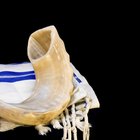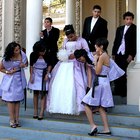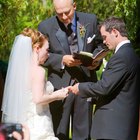
Some Islamic naming customs refer to the religion of Islam, while others are genealogical. When choosing a name for a new baby, the most important consideration for a Muslim is the guidance of the Quran, which can be followed even when living in a culture with different naming practices.
Boy Names
Muslim given names often contain some reference to the Islamic religion. According to the "World of Islam" website, it is common to combine one of the names of Allah with Abdul or Abdus, as in the names Abdul Aziz or Abdus Saboor. Abdus is only used in front of names beginning with S. The names Ahmad or Muhammad can be used in combination with one of the names of Allah, as in the name Muhammad Ali. These names are used because the Prophet Muhammad said that names expressing praise or service toward Allah are more beautiful than any others. To select a name for a baby boy, look up a name expressing service or praise toward Allah, or combine one of the names of Allah with another name. No baby is ever given one of the names of Allah on its own.
Girl Names
Muslim girl names may refer to women in the life of Muhammad, such as his wife Khadeeja or his daughters Kulthoom or Zainab, although many of them simply describe pleasant attributes. For instance, the name Husn means beauty and the name Leena means tender. Names can also refer to religious concepts, as in the names Iman, meaning faith, and Amatullah, meaning servant of Allah. Muslims often try to avoid names that could be construed as lacking in humility. For instance, Muhammad's wife Zaynab was originally named Barrah, meaning pious, but this name was felt to be presumptuous so it was changed.
Full Names
Because the Quran is written in the Arabic language, naming customs in Muslim cultures often follow Arabic tradition. Arabic names are usually genealogical, specifying the person's descent through the male line as well as the larger kinship group with which he is affiliated. For instance, according to the "World of Islam" website, the name Ali bin Ahmed bin Saleh Al-Fulani indicates a man named Ali, who is the son of Ahmed and the grandson of Saleh, of the Al-Fulani clan or family. According to "Family Tree Magazine," a woman named Amina bint Rashid would be the daughter of a man named Rashid. Women do not change their names when they get married, but the children are named according to their descent from the father.
Importance of Genealogy
Although Arabic naming customs may seem to be rooted in genealogy rather than in Islam, the Prophet Muhammad made several statements encouraging the use of naming customs to indicate genealogy. For instance, Al-Ahzab 33:5 specifically forbids the custom of using an adoptive father's name rather than the name of the biological father. This prohibition was intended to prevent unintentional marriages between close relatives. An article by Dr. Abu Ameenah Bilal Philips, on Zawaj.com, advises Muslim converts not to change their surnames for this reason, although changing the given name is acceptable. Many converts adopt Muslim names to fit in better with the Muslim community or to express their beliefs. However, there is no rule requiring them to do so.
Related Articles

The Meaning of a Flower Girl in a ...

What Is Fraternal Love?

Reasons to Get a Nose Ring

Protocols for a Native American Naming ...

Corsage Flowers & Meanings

What Does a Purple Iris Symbolize?

The Meaning of a Single White Rose

What Is the Meaning of the Tassels of ...

About Christian Men Wearing Earrings

Can I Be the Godmother of My Little ...

The Meaning of Exchanging Wedding Rings

Jewish Baby-Naming Ceremony Etiquette

Catholic Confirmation Gifts for Girls

What Is an African Kufi Hat?

What Is the Proper Way to Get Married ...

Catholic/Irish Surnames

Mexican Quinceanera Traditions

Adult Baptism Gifts

What Is a First-Degree Relative?

What a Minister Says at a Wedding
References
Resources
Writer Bio
Scott Thompson has been writing professionally since 1990, beginning with the "Pequawket Valley News." He is the author of nine published books on topics such as history, martial arts, poetry and fantasy fiction. His work has also appeared in "Talebones" magazine and the "Strange Pleasures" anthology.
Photo Credits
Getty Images/Getty Images News/Getty Images